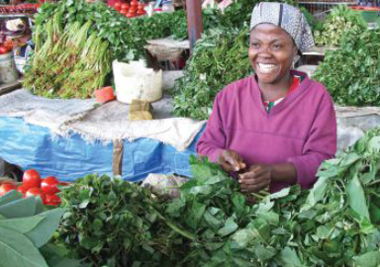Marita Dieling and Dyno Keatinge
The formation of the Association of International Research and Development Centers for Agriculture (AIRCA, www.airca.org) in 2012 was stimulated by the need for integrated action to deliver sustainable agricultural intensification at the landscape scale. AIRCA is a nine-member alliance of international research and development institutes committed to increasing food security by supporting smallholder agriculture and rural enterprises within healthy, sustainable, and climatesmart landscapes.
Supported by more than 60 member countries that comprise more than 70% of the world's population, AIRCA members have activities in all major geographic regions. All have a proven record of research, development, and implementation, working closely with farmers, extension systems, national research institutes, non-governmental organizations, and the private sector across a wide range of crops and ecosystems. The following organizations are the founding members of AIRCA:
AVRDC - The World Vegetable Center:
Alleviates poverty and malnutrition in the developing world through increased production and consumption of nutritious and health-promoting vegetables.
CAB International (CABI):
Improves people's lives by providing information and applying scientific expertise to solve problems in agriculture and the environment.
Tropical Agricultural Research and Higher Education Center (CATIE):
Specializes in tropical agriculture and natural resources, combining research, education, and outreach to provide innovative solutions for sustainable development.
Crops for the Future (CFF):
Contributes to sustainable agriculture and food systems by enabling greater use of underutilized crops through research, capacity development, and policy advocacy.
International Center for Biosaline Agriculture (ICBA):
Works in partnerships to deliver agricultural and water-scarcity solutions in marginal environments.
International Centre for Integrated Mountain Development (ICIMOD):
Enables sustainable and resilient development through knowledge transfer and regional cooperation to support equitable livelihoods and improved well-being for the people of the greater Himalayas.
African Insect Science for Food and Health (ICIPE):
Helps alleviate poverty, ensure food security, and improve the overall health status of people in the tropics by developing and extending management tools for harmful and useful arthropods while preserving the natural resource base through research and capacity building.

Indigenous vegetables in Africa.
International Fertilizer Development Center (IFDC):
Helps smallholder farmers in developing countries increase their agricultural productivity, generate economic growth, and practice environmental stewardship by enhancing their ability to manage mineral and organic fertilizers and participate profitably in input and output markets.
International Network for Bamboo and Rattan (INBAR):
Improves the well-being of the producers and users of bamboo and rattan within the context of a sustainable resource base.
AIRCA's vision is to put research into practice through sustainable improvements to incomes, nutrition, and food security. In particular, the intended outcomes of joint AIRCA initiatives are healthy landscapes-meaning healthy plants, enterprises, people, and animals living in a healthy and sustainable environment. By sharing our collective knowledge and experience in creating healthy landscapes, awareness of the benefits of the landscape approach will increase among potential stakeholders in the agricultural and environmental sectors. AIRCA's work is characterized by the following principles:
- Delivering impact at the agriculture-environment nexus.
- A concerted effort with a common vision.
- A holistic approach to smallholder agriculture and ecosystems.
- Ensuring sustainability of agricultural systems.
In October 2013, AIRCA released a white paper offering recommendations for transforming rural livelihoods in the developing world at the landscape level. This approach takes into account the diversity of interactions among people and the environment, agricultural and non-agricultural systems, and other factors that represent the entire context of agriculture.
To achieve these recommendations, AIRCA encourages the creation of innovative funding mechanisms that will facilitate the formation of partnerships between research and development organizations, countries, and regional networks to deliver practical solutions at the necessary scale, including the capacity to sustain these interventions over time and the development of sound policy to protect them.
The world will not achieve food security unless the needs of smallholder and family farms are adequately addressed.
We believe that a greater commitment to knowledge transfer among rural farmers and more effective uses of information technology are needed. Technologies must also be suited to the scale of these operations. Sustainable intensification involves trade-offs at many levels, from individual farms and communities to regional, national, and landscape scales. These trade-offs require difficult choices and should be the subject of more research, along with greater integration of development efforts.
Donor agencies and national governments need to invest their research and development funds in a more holistic manner so that development can occur across landscapes. The present piecemeal investment model has not been effective, and the partial failure to achieve the Millennium Development Goals concerning hunger and poverty will attest to that in 2015.
Marita Dieling, Executive Secretary,
Association of International Research and Development Centers for Agriculture (AIRCA),
Nairobi, Kenya,
This email address is being protected from spambots. You need JavaScript enabled to view it.
Dyno Keatinge, Director General AVRDC - The World Vegetable Center,
Shanhua, Taiwan,
This email address is being protected from spambots. You need JavaScript enabled to view it.
Top photo © Danymages|Dreamstime. Mid-page photo courtesy of AVRDC.




